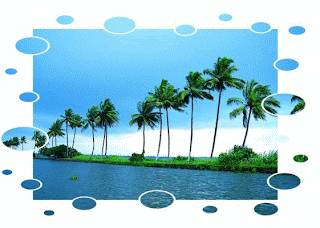
Kerala - The God's own country is a narrow, fertile strip of land on the south-west coast of India. The name Keralam in Sanskrit means the land added on. But the popular version is that it means the land of Kera, the Coconut. According to legend, the land was a gift of Parasurama, one of the ten Avatars (incarnations) of Lord Vishnu. It is believed that Parasurama threw his battle-axe into the sea, reclaiming the landmass, Kerala. This state consists of 14 districts with Thiruvananthapuram as its capital
Kerala is immensely blessed by nature with lush vegetation, tranquil beaches, stunning mountains, hill station, wildlife and bird sanctuary, forts and palaces, pilgrim centres, festivals and has a network of 44 major rivers and lakes on the backwater system.
Some of the famous wildlife sanctuaries in Kerala(kerala tourism) are at Thekkady in Idduki, Parambikulam in Palakkad, Sultan Bathery in Wayand district etc. The Periyar National Park is Kerala's one of the best wild life sanctuaries. Kerala has a fascinating heritage of art and culture. 'Kathakali', a rhythmic dance based on ancient epics and 'Kalarippayattu' the worlds oldest martial art are known all over the world. Kalarippayattu is said to be the origin of all other marital arts in this world. Tourist flock the shores of Kerala to learn these art. Some of the other art forms are 'Koothu', 'Koodiyattam', 'Mohiniyattam', 'Ottamthullal'
Kerala has a fascinating heritage of art and culture. 'Kathakali', a rhythmic dance based on ancient epics and 'Kalarippayattu' the worlds oldest martial art are known all over the world. Kalarippayattu is said to be the origin of all other marital arts in this world. Tourist flock the shores of Kerala to learn these art. Some of the other art forms are 'Koothu', 'Koodiyattam', 'Mohiniyattam', 'Ottamthullal'
Kerala stands as an example for religious harmony. All the temples, churches, Mosque stand shoulder to shoulder that sometimes one fails to distinguish between them. All the festivals like Christmas, Ramzan, Onam, Diwali is celebrated here same pomp and gaiety. Another interesting example of religious harmony is celebration of Pooram festival at Thrissur. Malayalees from all over the world irrespective of religious sentiment reach this district to watch this festival. This festival is known for the elephant march and fire-crackers
One of the most memorable experience for the tourist visiting Kerala(Kerala Tourism) is the opportunity to enjoy the backwaters of Kerala on a house boat (Kettuvallam). The boats cross shallow palm -fringed lakes studded with cantilevered Chinese fishing nets and cruise along the narrow shady canals. On the way one can see the real Kerala village life. Alappuzha or Alleppey is an important tourist centre in Kerala because of its amazing backwaters. A number of boat races are conducted every year.
Even the Kerala cuisine is known for its spicy and hot foods. Traditionally, in Kerala food is served on a banana leaf. One has to take food with right hand. Almost every dish prepared in Kerala has coconut and spices to flavour the local cuisine giving it a sharp pungency that is heightened with the use of tamarind, while coconut gives it its richness, absorbing some of the tongue-teasing, pepper-hot flavours. Tender coconut water is a refreshing nutritious thirst quencher. The crunchy papadam, banana and jackfruit chips can give french-fries a run for their money any day.
Ayurveda, is a Sanskrit word, derived from two roots: Ayur, which means life, and Veda, means knowledge. Ayurveda medical system, Which was evolved in India, is around the 5,000 year old. Kerala's equable climate, natural abundance of forests (with a wealth of herbs and medicinal plants) and the cool monsoon season (Jun - Nov) are the best suited for Ayurveda's curative and restorative packages. Even today, Ayurveda is widely practiced in Kerala, due to its rich traditional heritage and medicinal herb found abundant around the Western Ghats There are a many renowned centres in Kerala
Today Kerala is the most advanced state in India wiht the highest literacy rate and the lowest birth rate. Almost a quarter of the land area is covered by forest, with more than over 3500 plant species, most of them growing in the Western Ghats. Kerala's forest's abundant and diverse habitat support a variety of wildlife population. Cultivation varies from Paddy fields and coconut palms over the plains, while up in the hills, there are plantations of areca nut, cardamom, rubber, pepper, tea and coffee.
Keralites (the people of Kerala) are know for their harmony and temperaments among themselves. They always welcome outsiders with open hands and heart. Hospitality is a part of Kerala culture and are the best host one can see in this world.
skip to main |
skip to sidebar
Paradises On Earth
Copyright (c) 2008 Traveler's Paradise
Designed by NodeThirtyThree + Free CSS Templates
Pimped to Blogger by Template-Godown
Frozen Age
